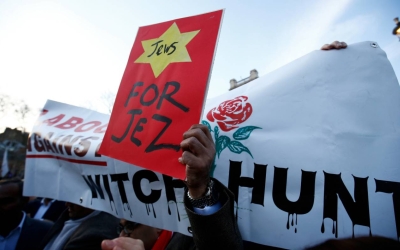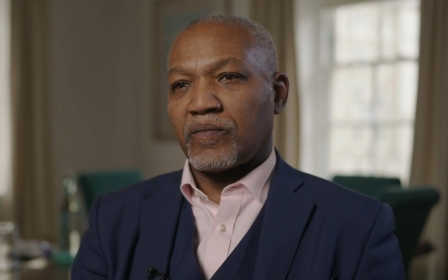The Holocaust survivor who can no longer call Labour home

If there is one issue that Keir Starmer has ruthlessly used to define his leadership of the British Labour Party and convince voters it is under new management after the Jeremy Corbyn era, it is antisemitism.
Rightly or wrongly, the issue just will not go away. It has been invoked to explain Starmer’s refusal to allow the former leader to stand as a Labour candidate at the next election - against all the rules of party democracy that the MP for Islington North upholds.
It was invoked in withdrawing the whip from Diane Abbott, after the publication of a letter in The Observer in which the longtime Labour MP drew a distinction between antisemitism and the racism suffered by people of colour, a comparison for which she later apologised.
It is invoked, too, by what remains of the left in the Labour Party. Left-wing campaign group Jewish Voice for Labour (JVL) maintains with some justification that Jews are five times more likely to face charges of antisemitism than non-Jewish members.
The point that JVL, a group that is open about its support for Palestinian rights, is making is that Starmer’s purge is directed at anti-Zionists in the party under the fig leaf of an ever-elastic and catch-all definition of antisemitism, which is being challenged in the UN.
New MEE newsletter: Jerusalem Dispatch
Sign up to get the latest insights and analysis on Israel-Palestine, alongside Turkey Unpacked and other MEE newsletters
If there is one person who is in a position to judge or debunk the merits of this debate, it is a man who has just walked away from the Labour Party in disgust after decades of membership.
Surviving Nazism
Stephen Kapos’ credentials in this debate are impeccable. Starmer knows him well. As a prospective parliamentary candidate for Holborn and St Pancras, a safe seat vacated by Frank Dobson, Starmer courted Kapos actively.
As a small boy in Hungary in 1944, Kapos remembers his mother and aunts cutting out yellow stars and sewing them onto his clothes. He remembers hiding from the Arrow Cross fascist movement, which rounded up Jews, shot them and dumped them into the Danube.
He remembers the clandestine shuffle between safe houses in Buda, when Jewish boys were spirited from one place to another to avoid detection from the local SS officers as the advancing Russian army approached and fighting engulfed them.
He remembers the panic of his aunt, who was in charge of a group of boys pretending to be war orphans, and had been invited to sit down for a mournful Christmas meal with Wehrmacht officers.
It was a scene worthy of Quentin Tarantino’s Inglourious Basterds.
“I remember the long white table, set beautifully with the Christmas Tree at one end, and the huge swastika flag at the other. We were seated between these old German soldiers. My aunt was in a panic, because if any boy had wanted to go to the loo, the cover would have been blown.”
He remembers his father’s description of Belsen-Bergen, where the bodies were piled up “like logs in winter”.
Accusations of McCarthyism
Kapos is a survivor. As a teenager, he had other trials, not least evading Stalin’s purges and fleeing to Britain in the wake of the Soviet invasion of Hungary in 1956, where he built a life as an architect.
All these memories were not far from the surface when the 85-year-old Holocaust survivor received a threatening message from the London office of Labour Party.
Kapos had been asked to speak about his experience as a child survivor of the Holocaust at an event scheduled by the Socialist Labour Network, a proscribed organisation under Labour Party rules.
The Socialist Labour Network describes itself as having been formed by the “merger of Labour Against the Witch-hunt and Labour in Exile Network”, two proscribed groups that believe the presence of antisemitism in the Labour Party was exaggerated as a means of undermining Corbyn’s leadership.

Labour warned him not to attend as a member of the panel or as a speaker if he wished to avoid a disciplinary process - which in practice would most likely lead to expulsion. It was a warning, but it was obviously intended as a threat.
In a blistering reply, Kapos told the Labour Party that its “attempt to effectively bar me from speaking about the Holocaust on Holocaust Memorial Day was the last straw”.
He accused Starmer’s Labour of reviving Senator Joe McCarthy’s notorious anti-communist witch hunts in the United States. “This period of the party’s history will be remembered with shame: this was when McCarthyism was revived and imported into the Labour Party - and into the political life of the UK itself,” he said.
It was an accusation Kapos was eminently qualified to make.
Kapos had always been a Labour man. “I was always a socialist in my outlook,” he explains. “I liked Harold Wilson and his resistance against joining in the Vietnam War. And his kind of reasonableness and tolerance in general.”
Kapos joined the Labour Party formally in 1997, the year of Tony Blair’s famous landslide general election victory. He became a member of his local Holborn and St Pancras constituency party, represented at the time by Dobson, Blair’s health secretary, who he knew well and of whom he speaks fondly.
He’s much less fond of Dobson’s successor in Holborn and St Pancras.
In a withering passage in his resignation letter, he accused Starmer of abandoning Dobson’s “warm and friendly” values and replacing them with “intimidation, banning of discussion of some of the most vital political topics, disregard for the party’s own rules, and for natural justice, the drastic reduction of inner party democracy, extreme factionalism, lack of support for striking workers.”
Middle East Eye has asked the Labour Party for comment.
A history with Starmer
Kapos first came across Keir Starmer following Dobson’s decision to stand down ahead of the 2015 general election: “It started off with a telephone call out of the blue.”
Both Kapos and Starmer were members of the local Kentish Town branch of the party.
'He was everywhere. At the beginning I was very much for him and liked him'
- Stephen Kapos on Keir Starmer
Starmer, already running an energetic campaign to replace Dobson, asked to meet Kapos at a local cafe to canvass him.
Kapos warned that he had already committed himself to a rival candidate, saying: “If you want to withdraw the invitation, I won’t hold it against you because you’ve got to be very busy.”
But Starmer wanted to meet anyway, and Kapos spent an hour with the future Labour leader. “He was emphasising about his local background and his working-class origins, all the people he knew.”
Kapos remembers that Starmer made a great deal of his friendship with then Labour leader Ed Miliband. “He was everywhere. At the beginning I was very much for him and liked him.”
Kapos recalls in particular Starmer’s caring response after he slipped down some stairs and broke a leg while delivering Labour Party leaflets.
Thereafter “every time I had Labour Party literature from his office, he had handwritten on it something about ‘I hope your leg is healing well’ and stuff like that. And I thought how many people is he doing this to? He was working hard and ingratiating himself. He was quite likeable.”
Kapos went door-to-door canvassing with Starmer before the 2016 Brexit referendum.
But before long disillusion set in, as Starmer “started on this antisemitism business, which was totally false”.
In 2020, the Equality and Human Rights Commission said there had been “significant failings in the way the Labour Party has handled antisemitism” under Corbyn’s leadership. Corbyn expressed regret that “it took longer to deliver that change than it should”, but said the problem was “dramatically overstated for political reasons”, with Starmer suspending his predecessor in response.
Local party members recall that as part of the 2015 election campaign, Starmer attended a meeting of the Camden branch of the Palestinian Solidarity Campaign (PSC). Today the Labour Party has banned its local parties from affiliating with the PSC, among other groups.
Sabby Sagall, chair of the Camden branch of the PSC, told MEE that approximately 70 people were present in 2015 and “the tenor of the meeting was support for Palestine, and support for sanctions against Israel”.
According to a report by the Socialist Worker, speakers included Frank Dobson and author John Rose, who “stressed the importance of the Boycott, Divestment and Sanctions strategy”. Needless to say, Starmer has said his party "does not and will not support" the BDS movement.
Sagall told MEE he could not remember whether Starmer shared pro-BDS views at the time - though he recalls that he spoke in support of Palestinian rights.
A clash of opinions
Throughout his adult life as a Labour Party activist in Britain, Kapos considered himself to be Hungarian rather than Jewish.
“It was when antisemitism began to be used as a kind of political weapon that I became more conscious of my Jewish heritage and background,” Kapos says.
Differences between Kapos and Starmer came to a head at a general council meeting of constituency Labour Party delegates. Kapos and Starmer spoke on opposing sides of a motion debating the scourge of antisemitism in the party.
“I then had to stand up and say there was nothing that I recognise as antisemitism in the party. I had to say that I am sensitised to antisemitism and that I had never experienced antisemitism in the party nor seen anybody who had been the victim of it,” Kapos recalls.
'It was when antisemitism began to be used as a kind of political weapon, that I became more conscious of my Jewish heritage and background'
- Stephen Kapos
“A debate followed and all of the amendments to a resolution put forward by [left-wing campaign group] Momentum critical of the stance of the party on this issue failed.” It was put to a vote, and Starmer’s position lost.
“He was furious. I came up to him afterwards and said I was sorry but that I had to be honest about my own experience. He told me I had divided the party and stormed off. We never spoke again.”
Kapos was outraged when Starmer, as candidate for the leadership in 2020, backed the ten pledges of the Jewish Board of Deputies, which include adopting the International Holocaust Remembrance Alliance's antisemitism definition and its controversial examples, which critics say silence Palestinian voices and experiences.
“I was angry. This was totally false, and that was obvious. I was astonished that he as a lawyer was capable of signing this rubbish,” Kapos says.
Kapos knew the price of attending the event scheduled by the Socialist Labour Network would be expulsion.
“And I thought to hell with it. I am not going to be silenced. To not speak about my experience, that was the last straw.”
Of Starmer, Kapos has one final word:
“He allows himself to be sold to the nation as dull but decent. A man full of integrity. In reality he is the exact opposite. He’s authoritarian and destroyed democracy in the Labour Party. But he will probably be prime minister. God help us.”
Middle East Eye delivers independent and unrivalled coverage and analysis of the Middle East, North Africa and beyond. To learn more about republishing this content and the associated fees, please fill out this form. More about MEE can be found here.






